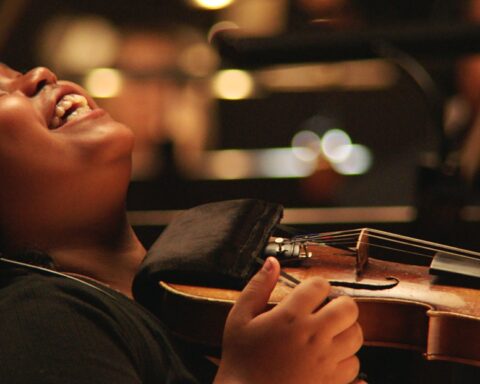Twenty Feet from Stardom
(USA, 91 min.)
Dir. Morgan Neville
Feat. Darlene Love, Merry Clayton, Lisa Fischer, Claudia Lennear, Jo Lawry, Judith Hill.
So many good rockumentaries of late tell stories of musicians that made it big after dogged hours striving for success. Searching for Sugarman, A Band Called Death, even As Time Goes by in Shanghai offer touching stories about how it’s never too late for a performer to see his or her name in shining lights. Enjoying the spotlight, that place in the sun for many musicians, is a treat few artists enjoy. It’s simply a fact that not every aspiring star can make it in the entertainment business. Some people have to step back so that others can have top billing.
Morgan Neville’s excellent documentary Twenty Feet from Stardom looks at some of the greatest voices in the music industry that viewers have probably never heard of. One will surely recognize the voices as soon as the music cues appear, whether they’re a snippet from a Rolling Stones song or a line from The Lion King, but most of the names and faces that grace the screen in Twenty Feet from Stardom will probably be foreign. It’s not that singers like Darlene Love, Merry Clayton, and Lisa Fischer aren’t any good or aren’t worthy of a marquee. Far from it, in fact—they’re born artists. These musicians are simply the back-up singers for some of the highest-billed performers in the business. Their recognition is scant, but their contribution is essential.
Neville, offering interviews with various back-up performers in the contemporary history of popular music, along with A-list singers such as Bruce Springsteen, Mick Jagger, Sting, and Bette Midler, shines the spotlight on some talented stars and gives credit that is long overdue. An interview with Stevie Wonder, for example, illustrates how important a back-up vocal is to the success of a song: he quickly sings a popular excerpt from Ray Charles’ “What I’d Say” and leaves out the back-ups’ role in the playful call-and-response section. The song doesn’t sound nearly as sexy when it’s just a man singing followed by dead air. The interviews with the A-listers and, more importantly, the back-ups themselves, gives the stars the status and glory they deserve, but never fully attained.
Fame, fortune, and stardom are just a shot away for talented voices like Merry Clayton, whose voice viewers will immediately recognize when “Gimme Shelter” appears on the soundtrack. Clayton and Mick Jagger recall the night that Clayton scored a last minute gig with the Stones and belted out the memorable, powerful female vocals that help make the track one of the band’s best. Clayton’s recollection of that night—she reportedly arose from her bed and did the recording, while pregnant, in pyjamas and with curlers in her hair—shows how back-up vocalists are as hardworking and talented as their headliner peers are. They’re also just as shrewd when it comes to making good music, as Clayton recalls upping the octaves in the vocals because she realized the potential that lied in recording this track with The Rolling Stones. It worked, as it made her part of a landmark song in rock ‘n’ roll history.
Other threads of Twenty Feet from Stardom, such as Claudia Lennear’s account of doing back-up vocals for various acts, tell stories of singers who had the chops to make it on their own, but didn’t find the success they deserved due to timing, circumstance, and gambles that didn’t pay off. Darlene Love, on the other hand, gives a fascinating account of doing ghost vocals for Phil Spector, who shut her out of a shot at stardom. Love persevered, though, and picked herself up and did all it took to play the lead.
Her determination continues in the rising star of Judith Hill, who was set to catapult to fame by going on tour with Michael Jackson. She didn’t get the chance due to Jackson’s sudden death. The silver lining of Judith’s tale is that her cancelled gig enabled her to take the lead and pay tribute to Jackson at his funeral. Judith is as talented, magnetic, and determined as her elders are; moreover, as she approaches fame, her story shows how stardom is ultimately a wobbly question of circumstance.
The unsung life of the back-up singer might best be encapsulated in the story of Lisa Fischer. Fischer, whom some of her peers describe as a “freak of nature,” has a voice of booming gusto. Her soulful sound has both the power and the industry recognition for top-level success. Fischer humbly recalls fruitful years singing with Luther Vandross, which eventually led to the launch of a solo career. Going out alone didn’t pan out for Lisa, however, and she resumed her career singing alongside different stars. She even scored the plum spot of lead female vocalist on tour with The Rolling Stones. Curiously, Twenty Feet from Stardom neglects to mention why the job didn’t go to Merry Clayton. It might have been fascinating to hear if and how a shot at success passed between singers.
Neville uses the singers’ voices as a conceptual layer throughout Twenty Feet of Stardom. Interviews with the talking heads include salient moments in which the singers simply listen to their own voices and recall the memory of recording the track. The candid expressions on their faces offer emotions both nostalgic and reflective. The old tracks play like a memory for a dream that was so close, yet also so far from being achieved.
Whether it’s the voice, the look, the persona, the moves, or the X Factor, the stories in Twenty Feet from Stardom suggest that there’s simply no key to predict stardom. Twenty Feet from Stardom surely has “it,” whatever “it” is, for Neville’s film is the complete package. Twenty Feet from Stardom is a vastly entertaining study of the unsung heroes of the business and this immaculately tailored, all-encompassing doc provides one of the best insights into the music industry moviegoers will ever see. Like this year’s other great rock doc Muscle Shoals, Twenty Feet from Stardom astutely allows the retrospective interviews reveal how music anticipated, challenged, and even bridged larger cultural gaps like race and class. The film is also a technical marvel, as it boasts softly lit compositions and deft camerawork that rivals that of most dramatic films. Likewise, the editing by Douglas Blush, Kevin Klauber, and Jason Zeldes is an excellent collage that skillfully connects the different singers in the film like a beautiful chorus. Each voice is a solo act and part of a greater ensemble. The voices of Twenty Feet from Stardom make beautiful music. The soundtrack, obviously, is one of the best to hit theatres this year. Not because it features such a great set of tracks—needless to say, it does—but because the poignant voices form the film’s very core.
Twenty Feet from Stardom brings the singers before the microphone and gives each powerhouse performer a chance to shine. As the singers take the microphone and display the full range of their pipes, Neville and cinematographers Nicola Marsh and Graham Willoughby capture them in beautiful close-ups and make each singer the star. The power of their voices is star-calibre in itself. Darlene Love’s sensationally soulful lead of “Lean on Me” might be the most powerful and emotionally raw moment one will see in a theatre this year. Like Jennifer Hudson’s star-making turn with “And I am Telling You I’m Not Going” back in 2006’s Dreamgirls, Twenty Feet from Stardom reminds the audience that some of the best vocalists in the industry were mere feet from fame—it takes the right mix of willpower and circumstance to go from singer to star. Love’s performance in Stardom’s final act, like Hudson’s showstopper or Clayton’s go-for-broke effort with the Stones, lets the audience feel a voice tinged with the hunger to succeed.
The layer of voracious emotion one hears in Twenty Feet from Stardom—both in the testimony and in the performances—accentuates the core message that should let the film touch the heart of every viewer. The stories from the singers lets Twenty Feet form Stardom nail the urgency one feels when striving to attain one’s dream. It’s not a dream of material wealth or of celebrity that the singers yearn for. (As Táta Vega humorously remarks, she’d have probably overdosed years ago had she risen to the top of the charts as a solo performers.) Rather, the singers simply want the chance to pursue their passion as a career. To be able to do what one loves as for a living, rather than as an odd gig, is an opportunity few artists receive. The hunger and the drive essentially create the difference between making the leap for the front of the stage from the back: not everyone can make it, so it might be best to sing from afar. The leap also requires a great act of courage, the singers say, because going solo lets others weigh the value of a singer’s natural gift: her voice. To sing back-up might be better than not being able to sing at all.
The stories told in Twenty Feet from Stardom form a bittersweet chorus about a passion for music that endures through the frustrating strive for success. There’s much pride to be had in being a back-up vocalist, the singers agree, for the role of the headliner isn’t suited for every personality. It’s all about the music for the back-up, while the celebrity act must put on a show both onstage and off. Singing back-up is all about the collaborative vibe of making music: good back-up vocals have a rhythm and spontaneity of their own. The act as a whole comes together when each talent harnesses his or her voice can uses it for the harmony of the group.
Twenty Feet from Stardom screens at the Bloor Hot Docs Cinema Thursday, July 18.
It opens in Toronto Friday, July 19 at the Cineplex Varsity and the Cineplex Yonge & Dundas.
It opens in Ottawa August 2nd at World Exchange Empire 7.











